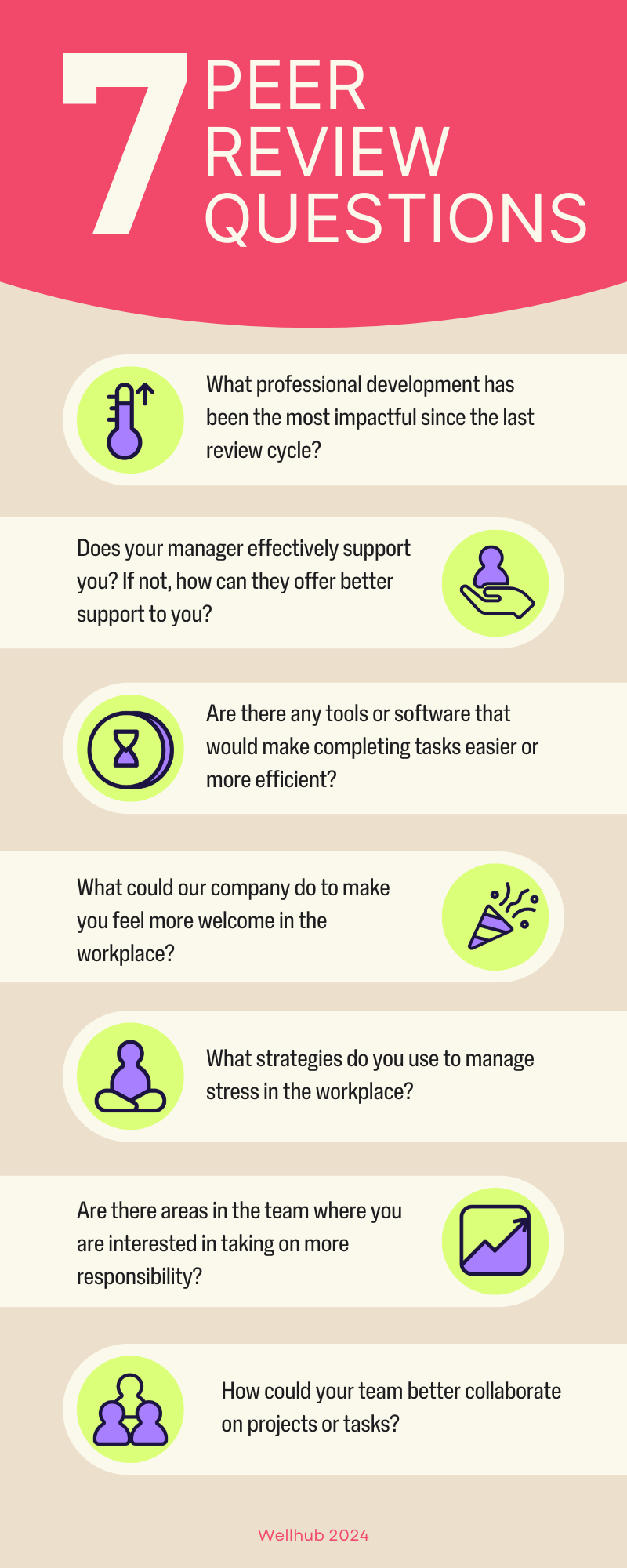33 Peer Review Questions That Can Improve Employee Evaluations
Last Updated Jan 28, 2025

Think back to your last review meeting. It took a lot of work to get ready, a lot of emotional vulnerability to share honest constructive feedback, and to document the whole process!
After all this effort, too many HR leaders are left wondering: Are these reviews genuinely helping anyone? Do they foster growth or just tick boxes?
If you can relate to this feeling, it signals a potential gap in your peer review process. It's time to transform these sessions from obligatory check-ins into engines of genuine growth and insight!
Let’s go over establishing a peer review system that does more than just go through the motions. You'll learn how to ask the right questions that encourage meaningful dialogue and ensure that feedback remains confidential, yet impactful.
If you’re ready to see real development in your team and turn those apprehensive faces into ones of eager anticipation, leverage these best practices that can revamp your peer reviews into powerful tools for professional development!
Peer Review Best Practices
Before diving into the questions, there are a few tips and tricks that can help facilitate a successful peer review process.
Open-Ended Questions
Asking employees to pose open-ended questions can prompt more valuable and insightful responses because they are not limited to yes or no answers. Instead, these questions allow people to elaborate on their responses and provide greater insight into their thoughts, processes, and experiences.
Enforce Privacy and Anonymity
Be sure to set expectations with all employees that they can't share or talk about answers given in a peer-to-peer review. Privacy enables employees to share honest, open feedback without fear of repercussions. It helps create a safe environment for people to be candid and address any challenges they're facing.
Likewise, let employees know the answers they give to their peers are only shared with human resources management and direct managers.
Evaluate Peer Reviews with Manager Reviews
Gathering insights from both peer and managerial perspectives allows employers to analyze feedback from different angles. With a complete picture, you can better formulate more accurate assessments and evaluations of your employees and develop more successful strategies for their career development. A complete picture of employees enables accurate assessments and better career development strategies.
Peer Review Questions
To get the most impact from peer reviews, encourage your employees to ask the right questions that will lead to meaningful and insightful responses. You can even give them a list of questions — like the one below — that they can choose from.

Performance Questions
Assessing how an employee gauges their performance can help ensure everyone is evaluating work the same way. This makes it easier for everyone to have a shared understanding of goals and progress.
For example, imagine an employee has consistently met their targets but says they haven't been successful in their role. What’s causing this?
It could be that the organization needs to do a better job of showing how individual effort contributes to overall success. Or, it could be that the employee is a workaholic who feels they can’t do enough and they need additional encouragement to take PTO.
Performance questions are a great opportunity to make sure everyone is speaking the same language. Examples you can ask include:
- What were your biggest successes this review period, and how did you accomplish them?
- Which goals have you achieved since your last evaluation that you are proud of, and how did they impact the workplace or team environment overall?
- What are your greatest strengths, and how have you used them at work recently to achieve success in a project or goal?
- Have you acquired any new skills since the last review cycle?
- What skills are you hoping to learn in the next quarter or next year?
- What additional skills would be beneficial for achieving success in this role over time?
- Are there any projects or tasks you struggled with in the past year, and if so, what did you learn from them?
- Do you see any areas of improvement in your job performance, and what would that look like?
- What areas could you improve on to better contribute to your team?
- Are there any strategies that have worked well for you in accomplishing tasks and achieving goals?
- Are there areas in the organization where you feel comfortable or interested in taking on more responsibility?
Personnel, Team, and Colleague Review Questions
The way your staff talks about their coworkers and teamwork can tell you a lot about how supported they feel and how well everyone works together. When they answer questions about these topics, you can get a sense of how much support and collaboration is going on.
If these questions uncover roadblocks in communication and collaboration, you can make a plan to help remove them. Alternatively, if one employee stands out as an interpersonal communications superstar, you might have a great candidate to lead a communications mentorship program!
Here are some peer-to-peer questions that can evaluate interpersonal relationships:
- Does your manager provide enough support for you to succeed in your current role, and how can they better support you?
- Does your manager provide clear goals and expectations for the team overall?
- How could your manager better evaluate and assist your performance or provide more support or resources?
- Is feedback given clearly and frequently enough by management to help develop yourself professionally within the company?
- How did you help collaborate with team members during a challenging project, and what kind of feedback did you receive from them?
- Can you describe a successful collaboration between yourself and other employees or teams?
- How could your team better collaborate on projects or tasks?
- How could the team use more efficient communication to improve project outcomes?
Workflow, Resources, Tools, and Systems Questions
To get a complete picture of an employee's performance, you can ask questions about their workflow and the tools they use. These inquiries can provide valuable insights into how employees optimize their work processes. You can find out if they’re able to access the right resources and systems for success or if additional tools or features could help them be more productive in their roles.
Here are a few questions employees can ask each other:
- Are there any tools or software that would make completing tasks easier or more efficient?
- Are there any changes or modifications to tools, systems, or processes that can help make your job easier or more enjoyable?
- Do other departments have resources that could potentially benefit this department’s workflow?
- Have there been any changes lately to how things are done at work, such as new processes, procedures, or technologies? If so, what were they, and how did they affect your role specifically?
- Is management open to employee suggestions and ideas when it comes to improving processes, procedures, and systems?
- (For remote teams, specifically) Does working remotely pose any challenges for completing certain tasks effectively compared to in-office collaborations?
Employee Experience Questions
Having peers ask employee experience-related questions can help you gauge employee satisfaction and engagement. This type of employee feedback gives you a complete picture of how they view the workplace environment. It also allows you to make changes or adjustments that contribute to a strong company culture.
Here are some examples of employee experience-related questions:
- How have you been able to stay motivated and productive during the last quarter?
- What strategies do you use to manage stress in the workplace?
- What are your biggest challenges in the workplace, and how have you managed them?
- Do you believe the company provides you with adequate professional development or career growth opportunities?
- Do you feel the company values and prioritizes employee wellbeing and work-life wellness?
- What could our company do to make you feel more welcome in the workplace?
Peer Feedback-Related Questions
Finally, it's helpful to ask a couple of questions about the peer review process itself so you know whether employees find it valuable. You can use their answers to evaluate and improve the process. Consider asking:
- Do you think peer feedback has been a helpful tool in developing yourself professionally within the company?
- What suggestions would you have for making peer review questions more effective and helpful for employee evaluations?
How to Get the Most From Peer Reviews
Asking the above questions can help you get useful feedback from peer reviews, but why stop there? Consider trying these strategies to get the most out of employee feedback.
Foster Open Communication
Try encouraging a culture of healthy communication and feedback in your organization. Employees should feel comfortable sharing their thoughts and opinions openly. This makes workers feel like they can truly give honest feedback. Consider establishing channels for transparent dialogue, whether that be anonymous surveys or regular employee-manager meetings.
Emphasize Mutual Respect
For peer reviews to be productive, employees need to feel respected. It's up to employers to foster an environment where peer reviews are viewed as thoughtful and courteous rather than belittling or competitive. You can emphasize — both in writing and verbally — that peer feedback is meant to be constructive and supportive. The goal is simply to provide actionable feedback that helps their peers develop professionally. Leaders should demonstrate this level of respect in their feedback, setting the example of how employees are expected to treat each other.
Provide Clear Expectations
Great peer reviews have well-defined guidelines for each step of the process. You should clearly communicate the purpose of peer reviews, the criteria for evaluation, the steps for giving reviews, and the desired outcomes. You may even want to provide an example peer review for employees to reference. If your peer review is a written survey, you could create an example with answers that demonstrate the expected tone and level of detail. Also, if reviews use a scoring system, try providing a detailed scoring rubric for employees to reference.
Incorporate Results Meaningfully
Now that you've gathered peer reviews, you'll want to use them effectively. For example, you can integrate the insights you gathered into employees' performance development plans. This reminds employees that the reason for doing reviews is to support their professional growth and advancement. It’s helpful to use peer feedback to identify strengths, areas for improvement, and development opportunities. Then, you can collaborate with employees to create actionable plans for their growth.
Set Up Regular Feedback Sessions
There's value in promoting ongoing exchanges between peers throughout the year rather than limiting feedback to formal review periods. Encouraging regular feedback sessions enables employees to address issues in real time and maintain open lines of communication. With regular reviews, recent events are also fresh in employees' minds, helping you get the most accurate insight. Plus, it gives the opportunity to celebrate workplace successes more frequently!
Record Reviews Effectively
You'll benefit from having an efficient and organized system for filing peer reviews. Organized record keeping lets you easily reference past reviews and metrics, helping you assess improvement with ease. Consider adopting a virtual filing method for recording results. If you have a digital peer review system, such as an online questionnaire, then you could automatically upload these files. For written or person-person reviews, consider scanning or video recording to accurately store your information.
Continuously Optimize Your Process
Regularly assessing the effectiveness of the peer review process and soliciting feedback from participants helps to identify areas for improvement. Then, you can adapt the review process as needed to address challenges, enhance transparency, and optimize outcomes.
By using these strategies to maximize your peer reviews, you can cultivate a culture of support, wellness, and growth.
Focus on Improving the Employee Experience
Peer reviews are an effective way to gain insights into how employees feel about their work and your organization. They are an effective way to gather boots-on-the-ground information about how things are going at your organization and ways the employee experience could be improved.
Insights into your employee experience are increasingly valuable. Today's workers want employers that support their personal wellbeing just as much as they foster professional growth. As detailed in Gympass’ 2024 State of Work-Life Wellness report, 93% of employees say their wellbeing is just as important as their salary.
If you’re interested in offering a wellness program that demonstrates your dedication to employee wellbeing, reach out to a Gympass wellbeing specialist today.

Company healthcare costs drop by up to 35% with Wellhub*
See how we can help you reduce your healthcare spending.
[*] Based on proprietary research comparing healthcare costs of active Wellhub users to non-users.
Category
Share

The Wellhub Editorial Team empowers HR leaders to support worker wellbeing. Our original research, trend analyses, and helpful how-tos provide the tools they need to improve workforce wellness in today's fast-shifting professional landscape.
Subscribe
Our weekly newsletter is your source of education and inspiration to help you create a corporate wellness program that actually matters.
By subscribing you agree Wellhub may use the information to contact you regarding relevant products and services. Questions? See our Privacy Policy.
Subscribe
Our weekly newsletter is your source of education and inspiration to help you create a corporate wellness program that actually matters.
By subscribing you agree Wellhub may use the information to contact you regarding relevant products and services. Questions? See our Privacy Policy.
You May Also Like

Performance Management: A Guide To Drive Growth | Wellhub
Discover how performance management supports employee development and wellbeing—empowering people beyond just meeting the metrics

Employee Feedback That Improves Performance | Wellhub
Positive, constructive and critical feedback all play a part in driving employee performance. Here’s how to use each one.

The 90-Day Employee Review: A Breakdown
90-day review questions can help new team members gauge their own performance and progress in a new role so they’re set up for future success with the company.